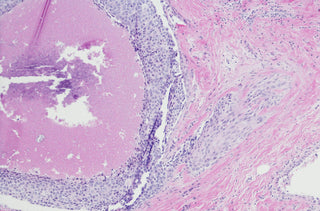When it comes to women’s health, there are few things scarier than the “c” word, especially breast cancer. After all, it accounts for 25% of all cancers and is the leading cause of cancer death among women. And while we have some understanding of risk factors, it’s clearly not enough because almost ¾ of diagnoses happen in women of “average” risk.
The good news is we may be on the verge of a breakthrough.
New research by the Mayo Clinic finds that there is a distinct breast tissue microbiome – the collection of microorganisms found in the body or a specific part of the body – that is different from the microbiome of the skin that covers the breast, and the bacteria found in healthy breast tissue are different from those found in cancerous breast tissue.
A similar study found that women with tumors had higher levels of the bacteria Enterobacteriaceae (including the strain E. coli), Staphylococcus and Bacillus, and these microorganisms damaged DNA. By contrast, women without tumors had higher levels of Lactococcus and Streptococcus bacteria, suggesting that these bacteria may have cancer-fighting properties – something bolstered by previous studies that showed the probiotic lactobacillus might be able to break down cancer-causing compounds, and that taking probiotic supplements with lactobacillus can result in an increase of that bacteria in the breast.
This information adds to our understanding of how the human microbiome affects our health and how differences in microbiota can play a role in diseases like cancer of the organs (such as the breasts, stomach, colon, liver, lungs, and skin).
So while changes in bacterial makeup, the appearance of a harmful strain of bacteria, or a deficiency in beneficial bacteria may all promote cancer development in the breast, further research can be done to identify potential causes of breast cancer and develop new microbial-based prevention.
If you’re worried about breast cancer, live a healthy, balanced lifestyle, and don’t discount the benefits of a balanced microbiome!
Concerned about breast cancer? Learn about the various risk factors that contribute to the development of this disease.
Reducing Your Breast Cancer Risk
Diet and lifestyle can dramatically reduce the risk of breast cancer. Start taking these steps today.
Breast Feeding Reduces Risk of Developing Breast Cancer
Nursing your child can benefit you, too. See what protective benefits breastfeeding offers against breast cancer.
Nutritional Supplements and Breast Cancer
Good nutrition can protect the body against all kinds of ailments, including breast cancer. Understand the role supplements can play in cancer prevention.
Moderate Drinking and Breast Cancer Risk
Moderate drinking confers health benefits in adults. But, in women, too much alcohol increases your risk for developing breast cancer. Learn how to moderate your intake to balance risk with benefits.

